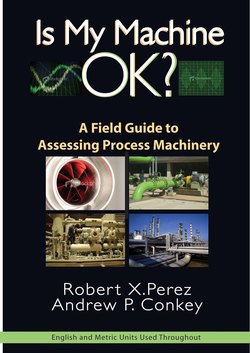Читать книгу Is My Machine OK? - Robert Perez X. - Страница 6
На сайте Литреса книга снята с продажи.
ОглавлениеTable of Contents
Cover
Title Page
Copyright
Dedication
Contributors
Acknowledgments
Chapter 1: Introduction
Chapter 2: A Brief Introduction to Machinery Monitoring
Why Do We Monitor Machines?
Assessing Process Machinery
Monitoring Systems
Medical Monitoring Analogy
Some Basic Advice
Chapter 3: General Machinery Monitoring Guidance
Where to Start?
When Should a Machine Be Considered Critical Enough to Justify Continuous Monitoring?
Machinery Monitoring Recommendations Based on Criticality
Simplified Method of Economic Justification
Chapter 4: Machinery Assessment Steps
The Machinery Assessment Maze
What machine information do I need before getting started?
What analysis equipment do I need?
The Potential to Failure Time Interval
Chapter 5: Machinery Data Analysis
Pattern Recognition
Trends
Correlations
Combination Trends
Some Rules of Thumb
Chapter 6: How to Audit Operating Machinery
Field Audit Form
Chapter 7: Risk Ranking Machinery Issues
Recommendations and Risk Ratings
Chapter 8: How to Assess Centrifugal Pump Performance
Why Use Centrifugal Pumps?
Head Versus Pressure
Centrifugal Pump Performance
Summary
Chapter 9: How to Conduct a Steam Turbine Field Inspection
Steam Turbine Types
What is the Steam Turbine Speed Telling You?
Assessing Steam Turbine Vibrations
Steam Turbine Temperature Assessment
Common Governor Control Problems
Other Inspections
Good Rules of Thumb for Steam Turbines
Chapter 10: AC Electric Motors
Introduction
Controls
Instrumentation
The Effects of Voltage Unbalance
Insulation Classes and Their Thermal Ratings
Re-greasing Electric Motors
Unique Vibration Characteristics of Electric Motors
Notes About Motors
Useful Electric Motor Formulas and Tables
Chapter 11: Allowable Piping Vibration and Dynamic Strain
Dynamic Strain and Stress Guidelines
Chapter 12: Data Collection Tips
Common Types of Field Sensors
What Vibration Sensor Should I Use?
What Are the Components of Vibration?
Guidelines for Accelerometer Usage
Accelerometer Measurement Locations
Vibration Analysis Tips
Chapter 13: Machine Vibration Severity Guides
Velocity Guidelines
Acceleration Guidelines
Vibration Guidelines for Displacement, Velocity, and Acceleration
Vibration Guidelines for Displacement Measurements in Fluid Film Bearings
Vibration Guidelines for Reciprocating Compressors and Engines
Chapter 14: Basic Vibration Analysis Part I
Common Machinery Problems Associated with Vibration
Chapter 15: Basic Vibration Analysis Part II
Vibration Analysis Terms and Tables
Examples of Real Vibration Spectra
Chapter 16: Detection of Machinery Faults Using Utrasonics
Monitoring Bearing and Lubrication Condition
Monitoring Reciprocating Machinery
Other Applications
Chapter 17: Dynamic Pressure Measurements
Pressure Transducer Installation
Piezoelectric Transducers
Allowable Pulsation Levels for Reciprocating Compressors
Allowable Pulsation Levels for Reciprocating Pumps
Chapter 18: How to Identify Machinery, Piping, and Acoustic Resonances
Rotor Critical Speeds
Identifying Piping Resonances
Identifying Critical Speeds and Resonances
The Quality Factor or Q
Chapter 19: Temperature Limits
How Do Infrared Thermometers Work?
Bearing Temperature Trending
Bearing Temperature Guidelines
Compressor Temperature Monitoring
K Values for Common Gases
Chapter 20: Lubrication
Introduction
Lubrication Overview
Key Steps to a Cost-Effective and Reliable Lubrication Program
Oil Analysis Limits and Targets
Cleanliness Codes
Chapter 21: Machinery Rules of Thumb
Alignment
Balancing
Static Shaft Bow
Mechanical Seal Misalignment Guidelines
Journal Bearing Clearance
Piping Guidelines
Centrifugal Pump Wear Rings
Chapter 22: Lean Equipment Compliance
Applying TPM to Industrial Equipment
Applying Poka-Yoke
Management Audit and Follow-Up
Glossary of Lean Equipment Compliance (LEC) Terms
Chapter 23: Final Thoughts
Importance of Adding Value
Keys to a Successful Machinery Assessment Program
Ethics and Intellectual Dishonesty
Go Forth and Analyze
Appendix A: Glossary of Machinery Assessment Terms
Appendix B: Useful Conversions and Equations
Index
